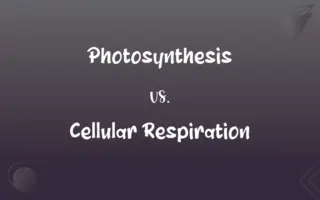Volatile Memory vs. Non-Volatile Memory: What's the Difference?
Edited by Aimie Carlson || By Harlon Moss || Updated on October 3, 2023
Volatile memory loses stored data when power is lost, while non-volatile memory retains data even without power.

Key Differences
Volatile memory necessitates power to retain stored information. RAM, a common example of volatile memory, stores data and information that are being processed actively by the CPU. Once a computing device is turned off, all information stored in its volatile memory is lost. This transient nature makes volatile memory unsuitable for long-term data storage but ideal for temporary storage that facilitates swift data access and processing.
Non-volatile memory, in contrast, retains stored data even when the power is turned off. Examples of non-volatile memory include Flash memory and Read-Only Memory (ROM). Since it does not require power to maintain stored data, non-volatile memory is utilized for persistent data storage. It holds crucial data like the system's firmware, which needs to be preserved across reboots.
The distinctive divergence between volatile memory and non-volatile memory revolves primarily around data retention during power fluctuations. The former loses its stored information without power, while the latter retains it. Moreover, volatile memory typically has faster read/write speeds than non-volatile memory, lending itself efficiently to active data processing.
Volatile memory is largely deployed in scenarios that require rapid data access and do not necessitate data retention after a power loss, such as system RAM used for running applications. On the other hand, non-volatile memory finds its application in areas where permanent data storage is imperative, like storing the operating system, user files, and application software.
Volatile memory tends to be faster but is also usually more expensive per unit of storage than non-volatile memory. Consequently, systems often leverage a combination of both, utilizing volatile memory for high-speed operations and non-volatile memory for stable, permanent data storage, achieving a balance between speed, durability, and cost.
ADVERTISEMENT
Comparison Chart
Data Retention
Loses data without power
Retains data without power
Speed
Generally faster
Typically slower
Cost
Tends to be more expensive
Usually more cost-effective
Usage
Temporary data storage
Persistent data storage
Dependency on Power
Requires power for data retention
Does not require power to retain data
ADVERTISEMENT
Volatile Memory and Non-Volatile Memory Definitions
Volatile Memory
Volatile memory is utilized for temporary data storage during operations.
When editing a document, it’s temporarily stored in volatile memory before saving.
Non-Volatile Memory
Non-volatile memory tends to have slower read/write speeds than volatile types.
Flash drives, using non-volatile memory, often have slower data transfer rates.
Volatile Memory
Volatile memory cannot preserve data in the event of a power outage.
If there's a power cut, unsaved work in volatile memory is lost.
Non-Volatile Memory
Non-volatile memory can be written to a limited number of times.
Each cell in an SSD can only be written a certain number of times before failing.
Volatile Memory
Volatile memory requires power to retain data.
RAM is volatile memory, losing its content when the computer is powered down.
Non-Volatile Memory
Non-volatile memory is essential for preserving system-critical data.
The operating system resides in non-volatile memory for sustained availability.
Volatile Memory
Volatile memory typically offers fast data retrieval.
The computer uses volatile memory to quickly access running applications.
Non-Volatile Memory
Non-volatile memory maintains stored data without power.
SSDs use non-volatile memory to store files persistently.
Volatile Memory
Volatile memory is instrumental in processing currently active tasks.
The CPU uses volatile memory to smoothly execute active processes.
Non-Volatile Memory
Non-volatile memory is typically utilized for permanent data storage.
The BIOS is stored in non-volatile memory to ensure boot functionality.
FAQs
What are examples of non-volatile memory?
Examples include SSD (Solid State Drive), HDD (Hard Disk Drive), and ROM (Read-Only Memory).
Why is non-volatile memory crucial for storing the operating system?
It retains the OS data even when the computer is powered down, enabling system boot-ups.
What is volatile memory?
Volatile memory is computer memory that requires power to maintain the stored information.
What happens to volatile memory when power is lost?
All data stored in volatile memory is lost when power is interrupted.
What are examples of volatile memory?
Examples include RAM (Random Access Memory) and cache memory.
What is non-volatile memory?
Non-volatile memory retains stored data even when power is disconnected.
Why is volatile memory typically faster than non-volatile memory?
Volatile memory, like RAM, is designed to speed up the operation of a computer by providing quick data storage.
Which is more expensive, volatile or non-volatile memory?
Volatile memory, like RAM, tends to be more expensive per unit than most forms of non-volatile memory.
Can a computer function without volatile memory?
No, a computer needs volatile memory (like RAM) to load and execute operating systems and applications.
Why is data retrieval faster from volatile memory than non-volatile memory?
Volatile memory, like RAM, is designed with physical properties that allow it to access data at higher speeds compared to non-volatile memory.
Can volatile memory be used for long-term storage?
No, volatile memory is unsuitable for long-term storage due to its data volatility.
Can non-volatile memory be used for long-term storage?
Yes, non-volatile memory is used for long-term data storage due to its persistent nature.
Is it possible to recover data from volatile memory after a power loss?
No, data stored in volatile memory is lost and cannot be recovered after a power loss.
What is DRAM and is it volatile or non-volatile?
DRAM (Dynamic Random-Access Memory) is a type of volatile memory.
Does non-volatile memory require power to retain data?
No, non-volatile memory preserves data without a continuous power supply.
What role does non-volatile memory play in a computer’s boot process?
Non-volatile memory stores the firmware (BIOS/UEFI) used during the computer's boot process.
Is flash memory volatile or non-volatile?
Flash memory is a type of non-volatile memory.
Can data in non-volatile memory be changed?
Yes, data in non-volatile memory can be changed, though it often has a limit on write cycles.
Why do computers generally use a combination of volatile and non-volatile memory?
To balance the need for speed (volatile memory) and persistent storage (non-volatile memory).
What is EEPROM and is it volatile or non-volatile?
EEPROM (Electrically Erasable Programmable Read-Only Memory) is a type of non-volatile memory.
About Author
Written by
Harlon MossHarlon is a seasoned quality moderator and accomplished content writer for Difference Wiki. An alumnus of the prestigious University of California, he earned his degree in Computer Science. Leveraging his academic background, Harlon brings a meticulous and informed perspective to his work, ensuring content accuracy and excellence.
Edited by
Aimie CarlsonAimie Carlson, holding a master's degree in English literature, is a fervent English language enthusiast. She lends her writing talents to Difference Wiki, a prominent website that specializes in comparisons, offering readers insightful analyses that both captivate and inform.































































